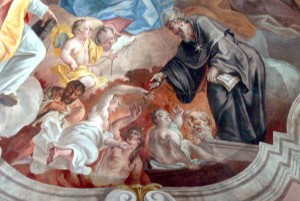 I pray daily for my friends in purgatory, the ones I know and the ones I don’t. Despite the confused and often impoverished religious formation in the 1970’s and 80’s my seventh grade teacher, Sr. Carla, managed to impress on me the importance of praying for the souls in purgatory, especially the ones who would have no one to pray for them. Over the years, God has deepened my understanding and valuation of this devotion. One thing I have come to appreciate more and believe is that they intercede for us. I think they must have been the ones to obtain for me the grace to spend a year in purgatory.
I pray daily for my friends in purgatory, the ones I know and the ones I don’t. Despite the confused and often impoverished religious formation in the 1970’s and 80’s my seventh grade teacher, Sr. Carla, managed to impress on me the importance of praying for the souls in purgatory, especially the ones who would have no one to pray for them. Over the years, God has deepened my understanding and valuation of this devotion. One thing I have come to appreciate more and believe is that they intercede for us. I think they must have been the ones to obtain for me the grace to spend a year in purgatory.
There are two key characteristics to purgatory. The first is that the souls who are there have been judged. When we die, we undergo what is called the particular, or individual, judgment. Scripture says that “it is appointed for men to die once, and after that comes judgment” (Heb. 9:27). I experienced what Romano Guardini says about judgment: “In this world, truth is weak. A trifle suffices to hide it…but it will change…God will bring it about that truth will be as powerful as it is true and this will be the judgment. Judgment means that the possibility of lying ceases because omnipotent truth penetrates every mind, illumines every word and rules in every place. Then falsehood will be revealed as what it is.” (Learning the Virtues, 22-23) Last year, God allowed His truth, my truth to penetrate my mind with searing clarity. He stripped away the layers and said it like it was. He used the people in my life to do this. He used excruciatingly painful interpersonal experiences. He also used books. Among others, two powerful tools were works of C. S. Lewis: The Great Divorce and Till we Have Faces. Through those literary pieces, time and again, God said to me as the prophet Nathan once said to the great King David, “You are that man!”
 The second characteristic of purgatory is hope. From the very outset God made it clear to me that He intended to heal me through the physical and moral sufferings He was allowing. Padre Pio manifested his spiritual fatherhood in tender ways and encouraged me regularly to open myself to God’s work in my soul. One poignant moment came through a letter of his I stumbled on just as I was getting weary of so much suffering. It is a letter to a woman who shares my name! Do you know what religion is? It is the academy of perfection in which each soul must learn to allow itself to be handled, planed and smoothed by the divine Spirit,…so that [one] can be united and joined to the will of God. (…) Religion is a hospital for the spiritually ill who wish to be cured, and in order to achieve this they submit themselves to bleeding, the lancet, the razor, some probing, surgical instruments, fire and all the pains of medicine. O my daughter, do not give too much importance to what the enemy and your imagination suggest to you regarding your interior suffering and spiritual aridity, being sure that this is the best for you. Lovingly, sweetly and lovably make this resolution: either be cured or die. And as you don’t want to die spiritually, try to be healed perfectly. And in order to be healed, desire to bear the treatment and correction of the divine doctor and beseech Him not to spare you anything in order to save you. (Letter of P. Pio to Maria Gargani, 12/1917)
The second characteristic of purgatory is hope. From the very outset God made it clear to me that He intended to heal me through the physical and moral sufferings He was allowing. Padre Pio manifested his spiritual fatherhood in tender ways and encouraged me regularly to open myself to God’s work in my soul. One poignant moment came through a letter of his I stumbled on just as I was getting weary of so much suffering. It is a letter to a woman who shares my name! Do you know what religion is? It is the academy of perfection in which each soul must learn to allow itself to be handled, planed and smoothed by the divine Spirit,…so that [one] can be united and joined to the will of God. (…) Religion is a hospital for the spiritually ill who wish to be cured, and in order to achieve this they submit themselves to bleeding, the lancet, the razor, some probing, surgical instruments, fire and all the pains of medicine. O my daughter, do not give too much importance to what the enemy and your imagination suggest to you regarding your interior suffering and spiritual aridity, being sure that this is the best for you. Lovingly, sweetly and lovably make this resolution: either be cured or die. And as you don’t want to die spiritually, try to be healed perfectly. And in order to be healed, desire to bear the treatment and correction of the divine doctor and beseech Him not to spare you anything in order to save you. (Letter of P. Pio to Maria Gargani, 12/1917)
This hope of healing enabled me to keep going forward, to endure the pain, to allow God to tell me my truth and all along to trust in His love for me. During the year I heard a priest say, “God will not work in your soul or purify you, unless you allow Him to.” In Mere Christianity, Lewis explains that God accepts you as you are but he also dreams to see you better. God’s invitation to perfection is not something we undertake as the protagonists so much as allowing God to polish, purify and perfect us. In fact, John Paul II pointed out that the term purgatory “does not indicate a place but a condition of existence. Those who, after death, exist in a state of purification, are already in the love of Christ who removes from them the remnants of imperfection.” (General Audience, Wednesday 4 August 1999)
Every time I look back over that year, my heart overflows with gratitude to God. I was submerged in His mercy. St. John Paul II said, “Those who live in this state of purification after death are not separated from God but are immersed in the love of Christ.” Through what I suffered, God filled me with His love, healed my profound wounds and transformed my heart. At the beginning of my journey, He made the invitation to me: “will you lay down your life… so I may take it up again?” I said yes and died so many deaths that year but they are nothing compared to the new life He has given me. My year in purgatory was a gift. I wouldn’t be surprised if some of my friends there asked God to give it to me. After all, the souls in purgatory are not separated from the saints in heaven “nor from us on earth – who continue on our pilgrim journey to the Father’s house.” (General Audience) I look forward to the day when I will meet them there.
